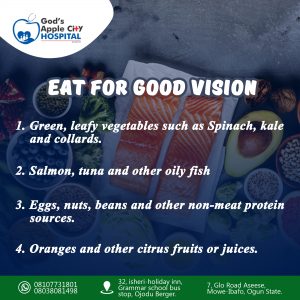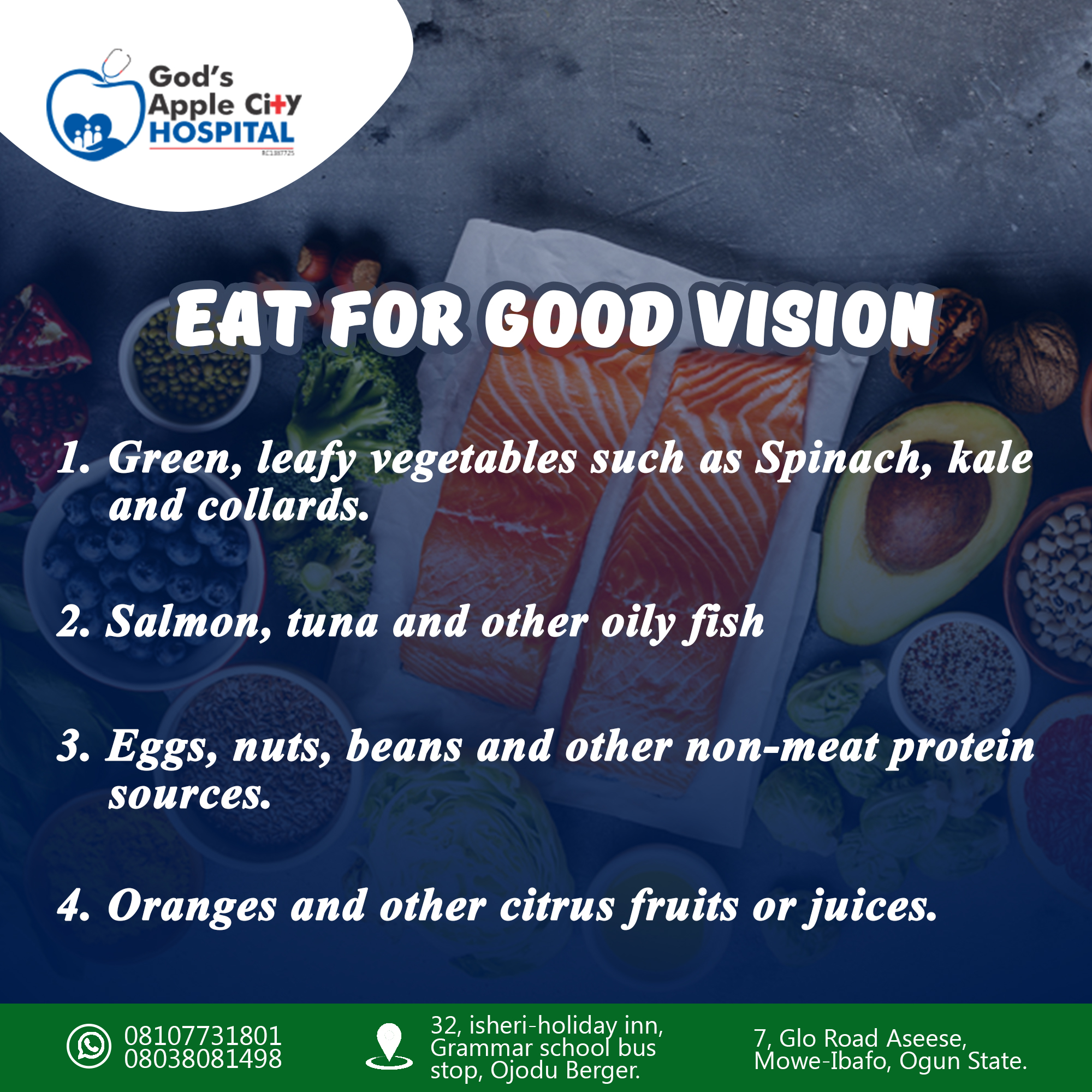Eat for good vision
Green/Leafy vegetable
fresh parsley, dill, cilantro celery, collard greens and spinach
Contains: Lutein and Zeaxanthin, Calcium, Phosphorus, Potassium, Vitamin C, A, Group B
It helps to:
-
Protect the retina from the age of destruction
-
Prevent the development of cataracts
-
Regulate intraocular pressure
-
Help with lesions of the optic nerve
Marine fish
Salmon, Sardines, Tuna, Mackerel, COD and Herring.
Contains: Fatty Acids and Protein
It helps to:
-
Improves the function of blood vessels
-
Strengthens the eye muscle work
-
Prevent and slow the progression of eye disease
With eye disease every year is to take a course of fish oil.
Egg
Contains: Lutein, Protein, Vitamin B, A and Others.
It helps to:
-
Protect the optic nerve
-
Prevents the formation of Cataracts
Useful to use: Better Boiled.

Nuts
Walnuts are the best source of Omega-3s. they are full of antioxidants and vitamin E, which work to combat inflammation and preserve cardiovascular health.
A nutrient known for protecting eyes from free-radical damage. Vitamin E may also hinder the progression of Cataracts and age-related macular degeneration.
Beans
Beans are a good source of Zinc.
A mineral that is vital to eye health,
It helps get Vitamin A form the liver to the retina for eye-protective melanin production and proper amounts of Zinc help with night vision.
Sour milk products and milk
Cottage cheese, Sour cream, Yogurt.
Contains: Vitamin D, B2 and Calcium
It helps to:
-
See better in the dark
-
Brighter perceive color
-
Protect the retina from ultraviolet radiation, from the eye lens opacity (Cataract)
Citrus
Grapefruit, Orange, Tangerine and Lemon
Contains: Vitamin C
It helps to:
-
Improve eyesight
-
Strengthen blood vessels of the eye
-
Maintain normal blood circulation
Useful to use:
-
Fresh or in juice form
-
Lemon juice is added to salads and other ready-made meals
Apricot
Contains: Beta-Carotene, phosphorous, fiber, vitamin A, C, E, B, F (Biotin)
It helps to:
-
Fix problems with night vision
-
Strengthen blood vessels eye
Useful to use: Fresh or in dried form syrups, jams
Beet
Contains: Vitamin B, C, E, U, Zinc, sodium, phosphorus, iodine, manganese and folic acid
It helps to:
-
Improve visual acuity
-
Relieve eye fatigue
Useful to use: Fresh, cooked, as salads, dishes other additives in the form of juice with the addition of lemon juice.
Beef
Contains: Protein, selenium, Vitamin B, A, C, PP, Trace elements: Zinc, potassium, calcium
It helps to:
-
Improves the blood system
-
Improves visual acuity
-
Cataract prevention
-
Prevention age-related degeneration of the retina
Carrot
Contains: Vitamin A (Carotene), B, C, E, PP, Minerals: Potassium, Iron, Iodine and Copper
Useful for:
-
Conjunctivitis
-
Blepharitis, Myopia
-
Fatigue and pain in the eyes
Useful to use: Fresh, in the form of salads or juice, (Beta-Carotene and vitamin A are cleaved by reacting with fat, so it is necessary to add to a salad cream or vegetable oil, and juice-little cream)
Blueberries
Contains: Vitamin C, B1, B2, A, Tannins, Pectin, Malic acid, succinic acid and lactic acid, large amounts of manganese.
It helps to:
-
Remove the inflammation
-
Restore sight by 30 – 40%
-
Increases visual acuity
-
Slows the deterioration of age
-
It improves blood flow to the eye tissue
-
It prevents many eye diseases (Glaucoma, Cataracts)
Useful to use: Fresh, frozen, in the form of jam, syrup, of dried fruit can be prepared vitamin teas, instilled a solution of blueberry juice into the eyes (Two drops of boiled water for one drop of juice).
.
.
.
.
.
.
.
.
.
.
.
.
https://web.facebook.com/Godsapplecity
read other blogs

